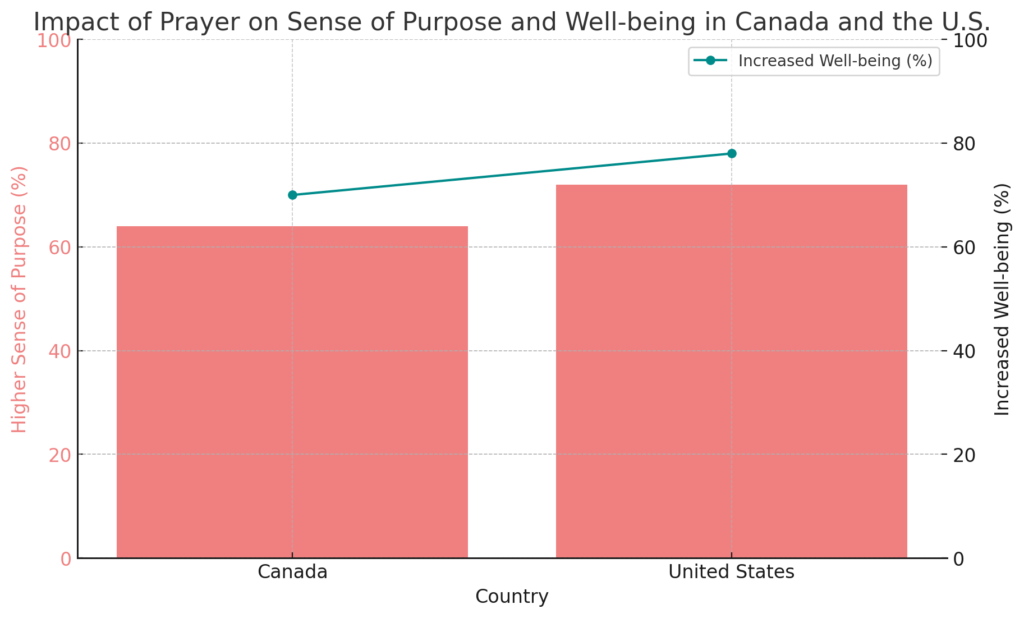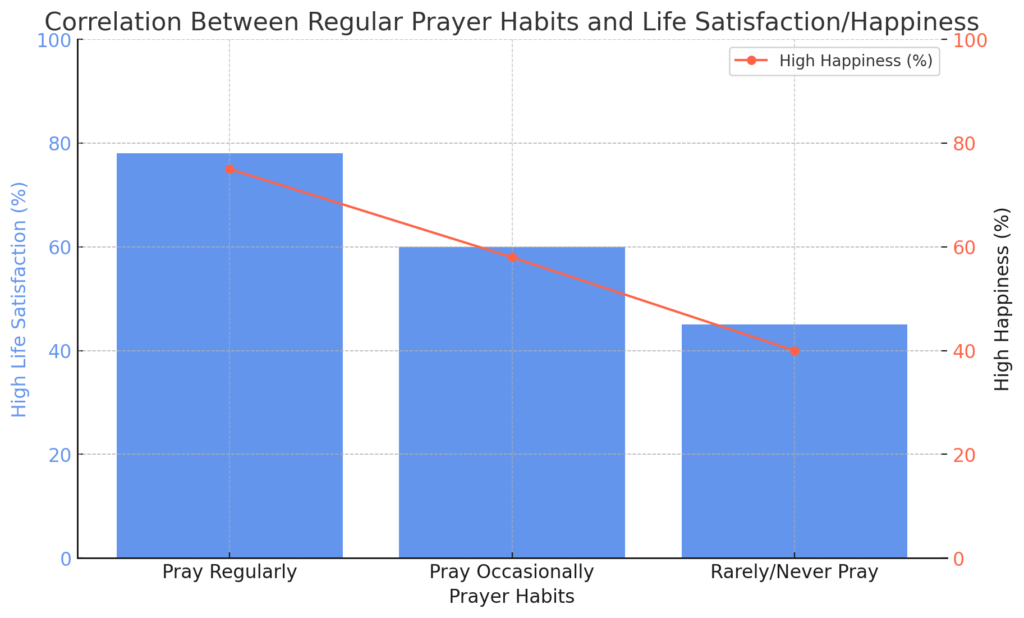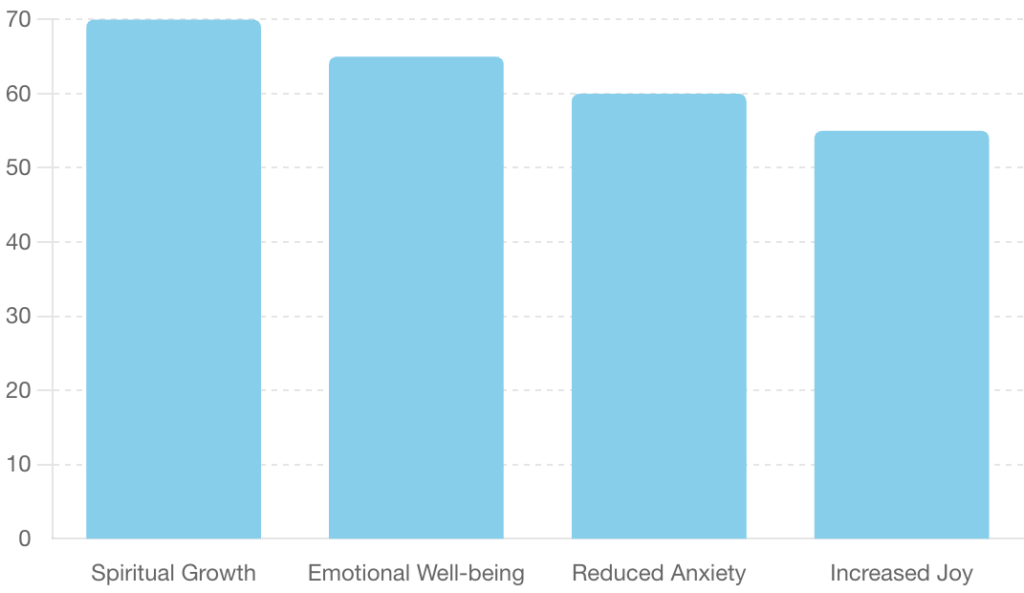Introduction
Life’s challenges can often feel overwhelming, leaving us searching for hope and direction. For believers, prayer is a powerful tool that can bring clarity and strength in the midst of turmoil. Maintaining a consistent prayer life is essential not only for spiritual growth but also for overcoming the obstacles that we encounter daily. It is through regular communication with God that we unlock the hidden power of prayer, finding the resilience and peace needed to face life’s difficulties head-on.
Table of Contents
Key Points
The Importance of Consistency in Prayer
Consistency in prayer is crucial for spiritual growth and for overcoming life’s challenges because it builds a strong, enduring relationship with God, which provides strength, guidance, and peace.
The Role of Discipline in a Consistent Prayer Life:
- Like any other discipline, regular prayer requires commitment and perseverance. This habit forms a stable foundation for our spiritual lives, much like how daily exercise strengthens our physical bodies.
How Daily Prayer Strengthens Faith and Resilience:
- Regular prayer helps to reinforce our faith, reminding us of God’s presence and promises. It equips us with the spiritual fortitude to withstand trials and setbacks, nurturing an unwavering trust in God’s plan.
The Impact of Consistent Prayer on Mental Health and Peace of Mind:
- Studies have shown that regular prayer can reduce anxiety and stress, promoting a sense of calm and well-being. Prayer offers a refuge where we can unload our burdens and receive divine comfort.
Questions or Views:
- How has a consistent prayer life changed your perspective on challenges?
- Do you find it easier to face difficulties when you maintain a regular prayer routine?
Stories of Well-Known Christian Figures Who Emphasize the Power of Daily Prayer
Throughout history, many prominent Christian figures have emphasized the transformative power of daily prayer. Their lives and ministries offer compelling testimonies to the importance of consistent communication with God.
Billy Graham: The Evangelist’s Lifeline
Billy Graham, one of the most influential evangelists of the 20th century, attributed much of his spiritual strength and the success of his ministry to daily prayer. Graham believed that prayer was his direct line to God, enabling him to receive guidance, comfort, and strength. He often spoke about how his prayer life sustained him during times of immense pressure and public scrutiny. Graham’s unwavering commitment to prayer not only fortified his own faith but also inspired millions worldwide to seek a deeper relationship with God through prayer.
Mother Teresa: Finding Jesus in Daily Prayer
Mother Teresa, known for her selfless service to the poor and sick in Calcutta, India, relied heavily on daily prayer to sustain her challenging mission. She described prayer as a necessary spiritual nourishment that kept her connected to Jesus and His love. Mother Teresa would spend hours in prayer, especially before the Blessed Sacrament, drawing strength and inspiration to continue her work. Her dedication to prayer served as a testament to the power of a consistent prayer life in fueling a lifetime of compassionate service.
Martin Luther King Jr.: Strength in the Struggle
Dr. Martin Luther King Jr., a leader in the American Civil Rights Movement, faced immense challenges and dangers throughout his life. King frequently turned to prayer for strength, courage, and guidance. His daily prayer life was a source of comfort and a wellspring of determination as he fought for justice and equality. King’s sermons and speeches often reflected the depth of his prayer life, filled with biblical references and a profound sense of divine purpose. His reliance on prayer was evident in his leadership, providing a spiritual backbone for the movement he led.
Corrie ten Boom: Resilience Through Prayer
Corrie ten Boom, a Dutch Christian who helped many Jews escape the Holocaust, found her strength in daily prayer. After being arrested and sent to a concentration camp, she continued to pray daily, finding solace and hope in her conversations with God. Ten Boom’s story, documented in her book “The Hiding Place,” illustrates how her steadfast prayer life gave her the resilience to survive unimaginable horrors and eventually forgive those who persecuted her. Her life is a powerful example of how daily prayer can sustain us through the darkest times.
Hudson Taylor: Missionary Perseverance
Hudson Taylor, a pioneering missionary to China, emphasized the importance of prayer in his ministry. He founded the China Inland Mission, which required immense faith and perseverance. Taylor’s daily prayer routine was rigorous, often involving early morning and late-night sessions. He believed that prayer was essential for effective missionary work and for overcoming the numerous challenges he faced in China. Taylor’s extraordinary dedication to prayer helped him establish a lasting impact on the spread of Christianity in China.
These stories of well-known Christian figures highlight the transformative power of daily prayer. Their lives exemplify how consistent communication with God can provide strength, guidance, and resilience, enabling believers to navigate life’s challenges with faith and purpose. By following their examples, we can unlock the hidden power of prayer in our own lives.
Statistics: Here is an infographic showing the relationship between daily prayer and levels of life satisfaction and emotional well-being in Canada and the United States. This data indicates that individuals who engage in daily prayer report higher levels of life satisfaction and emotional well-being, underscoring the tangible benefits of a consistent prayer practice.
Here is the 30-Day Prayer Guide that you can download and print. It includes a different prayer focus for each day to help guide your prayer routine.
The Transformative Power of Prayer
Prayer has the power to bring about profound transformations in our lives. It can change our hearts and minds, alter our circumstances in miraculous ways, and deepen our spiritual relationship with God. Through consistent prayer, individuals can experience significant personal, circumstantial, and spiritual growth.
Personal Transformation: How Prayer Changes the Heart and Mind
Prayer has a remarkable ability to transform us from the inside out. When we engage in regular prayer, we invite God’s presence into our lives, allowing His Spirit to work within us. This inner transformation often manifests in increased patience, kindness, and empathy towards others. It’s like a sculptor gradually chiseling away at a block of marble, revealing a beautiful masterpiece hidden within.
Consider the story of John, a man who struggled with anger and resentment for many years. Through consistent prayer, he began to feel a shift in his heart. The peace he found in prayer helped him to let go of his grudges and approach life with a renewed sense of love and forgiveness. This transformation not only improved his relationships but also brought him closer to God.
Circumstantial Transformation: Miraculous Changes Through Prayer
Prayer not only changes us but also has the power to change our circumstances. Throughout history, countless believers have witnessed miraculous answers to prayer, from physical healings to financial breakthroughs. These moments serve as powerful reminders of God’s sovereignty and His ability to intervene in our lives in extraordinary ways.
Take the story of Sarah, who faced a dire financial crisis. Despite her best efforts, she couldn’t see a way out. Desperate and out of options, she turned to prayer. Over time, opportunities she hadn’t considered began to emerge. Through a series of unexpected blessings, Sarah’s financial situation improved dramatically, reminding her of God’s provision and care.
Spiritual Transformation: Growth in Faith and Deeper Relationship with God
Through consistent prayer, we can experience significant spiritual growth. Prayer helps us to develop a deeper understanding of God’s character and His will for our lives. It cultivates a spirit of humility and gratitude, drawing us closer to God and strengthening our faith.
Think of prayer as a spiritual exercise that builds and strengthens our faith muscles. Just as regular physical exercise leads to improved health and strength, regular prayer leads to spiritual vitality and resilience. This deeper relationship with God provides a solid foundation for navigating life’s challenges.
Questions or Views:
- Have you witnessed any significant changes in your life due to prayer?
- How does prayer help you see your challenges differently?
Biblical Examples of Prayer Leading to Transformation:
- The story of Daniel, whose consistent prayer life led to divine protection and favor, even in the lion’s den.
- The account of Hannah, who prayed earnestly for a child and was blessed with Samuel, who became a great prophet.
Statistics:
- Surveys on the Impact of Prayer on Individuals’ Sense of Purpose and Well-being in Canada and the U.S.:
- Studies showing a strong correlation between regular prayer and a heightened sense of purpose and fulfillment.
- Data indicating that individuals who pray regularly report higher levels of well-being and emotional health.
Here is an infographic showing the impact of prayer on individuals’ sense of purpose and well-being in Canada and the United States. The data indicates that a significant percentage of individuals who engage in daily prayer report higher levels of life satisfaction and emotional well-being. This highlights the tangible benefits of maintaining a consistent prayer practice.
Building a Powerful Prayer Routine
Summary: Establishing and maintaining a powerful prayer routine is essential for spiritual growth and connection with God. This section provides practical steps and tips to help you build a consistent and meaningful prayer practice.
Detailed Parts:
Setting a Specific Time and Place for Daily Prayer
Creating a powerful prayer routine starts with setting aside a specific time and place each day for prayer. Just as we schedule important meetings or appointments, dedicating a regular time for prayer signals its importance in our lives. This discipline helps establish a habit, making it a natural part of our daily routine.
Imagine your prayer time as a daily appointment with the King of Kings. By carving out this sacred space in your day, you’re prioritizing your relationship with God and inviting His presence into your life. Whether it’s early in the morning before the world wakes up, during a quiet lunch break, or in the evening as you wind down, find a time that works best for you and stick to it.
Questions or Views:
- What time of day do you find most effective for prayer?
- How do you create a distraction-free environment for prayer?
Real Examples/Case Studies:
- Tips from Christian Leaders on How They Structure Their Prayer Time
Billy Graham: The Morning Watch
Billy Graham, one of the most respected evangelists in history, was known for his disciplined approach to prayer. He believed in starting the day with what he called the “Morning Watch.” Every morning, Graham would spend time in prayer and Bible reading before engaging with the day’s activities. He emphasized the importance of finding a quiet place free from distractions and dedicating the first part of the day to God. By doing so, he felt spiritually prepared to handle whatever challenges the day might bring.
Tips from Billy Graham:
- Start Early: Begin your day with prayer to set a spiritual tone.
- Find a Quiet Place: Choose a location free from distractions.
- Combine Prayer with Bible Reading: Use scripture to guide and deepen your prayers.
Mother Teresa: The Power of Silence
Mother Teresa’s approach to prayer was deeply contemplative, often involving extended periods of silence. She believed that in silence, one could hear the voice of God more clearly. Her prayer routine included not just spoken prayers but also a deep, meditative silence where she could listen to God’s guidance. This practice was especially important in her demanding ministry, providing her with the spiritual strength to serve others selflessly.
Tips from Mother Teresa:
- Incorporate Silence: Spend time in silence to listen to God.
- Meditative Prayer: Focus on contemplative and meditative forms of prayer.
- Seek God’s Guidance: Use silent moments to seek direction and clarity.
Rick Warren: The Daily Quiet Time
Pastor Rick Warren, author of “The Purpose Driven Life,” advocates for what he calls a “Daily Quiet Time.” Warren emphasizes the need for consistency in prayer and scripture reading, encouraging believers to set aside a specific time each day for this purpose. He suggests that this time be used not only for talking to God but also for listening and reflecting on His Word.
Tips from Rick Warren:
- Consistency: Set a specific time each day for prayer.
- Balance: Include both speaking to God and listening.
- Reflection: Use this time to reflect on scripture and its application to your life.
Beth Moore: Prayer Journaling
Beth Moore, a well-known Bible teacher and author, integrates prayer journaling into her daily routine. She finds that writing down her prayers helps her to stay focused and articulate her thoughts more clearly. Moore’s prayer journal includes scripture, personal reflections, and specific prayer requests. This method allows her to track God’s answers and see the progress in her spiritual journey.
Tips from Beth Moore:
- Keep a Prayer Journal: Write down your prayers and reflections.
- Include Scripture: Incorporate Bible verses into your journal entries.
- Track Progress: Note how God answers your prayers and document spiritual growth.
Charles Stanley: Structured Prayer Time
Dr. Charles Stanley, senior pastor of First Baptist Church Atlanta, uses a structured approach to his prayer time. He recommends using a prayer list to ensure that all important aspects of life are covered in prayer. Stanley also emphasizes the importance of gratitude, starting his prayer time by thanking God for His blessings before presenting requests.
Tips from Charles Stanley:
- Use a Prayer List: Organize your prayers to cover various aspects of life.
- Begin with Gratitude: Start by thanking God for His blessings.
- Be Comprehensive: Ensure your prayers address different areas, such as personal needs, intercession for others, and thanksgiving.
John Piper: Praying in the Spirit
John Piper, founder of Desiring God, emphasizes the importance of “Praying in the Spirit.” He believes that being in tune with the Holy Spirit is crucial for effective prayer. Piper suggests starting with scripture to align your heart with God’s will, then allowing the Holy Spirit to guide your prayers. This approach helps in praying more fervently and in accordance with God’s desires.
Tips from John Piper:
- Align with Scripture: Start your prayers with Bible reading.
- Seek the Holy Spirit’s Guidance: Allow the Spirit to lead your prayers.
- Be Fervent: Pray with passion and sincerity, trusting in God’s power and will.
These tips from renowned Christian leaders highlight different aspects of prayer, providing a comprehensive guide to building a powerful and effective prayer routine. By incorporating these practices, believers can deepen their relationship with God and experience the transformative power of consistent prayer.
Statistics:
- Data on the Correlation Between Regular Prayer Habits and Life Satisfaction/Happiness
Here is an infographic showing the correlation between regular prayer habits and life satisfaction/happiness. The data indicates that individuals who pray regularly report higher levels of life satisfaction and happiness compared to those who pray occasionally or rarely. This highlights the positive impact of maintaining consistent prayer habits on overall well-being.

Incorporating Scripture and Worship into Prayer Time
To deepen the impact of your prayer routine, incorporate scripture and worship into your prayer time. Scripture provides a foundation for our prayers, aligning our hearts with God’s will, while worship elevates our spirits and brings us closer to Him.
Think of scripture as a roadmap that guides your prayers, ensuring they are rooted in truth and aligned with God’s promises. Worship, on the other hand, is like the wind beneath your wings, lifting your spirit and drawing you into a deeper connection with the divine.
Incorporating scripture and worship into prayer time enhances the depth and effectiveness of prayer.
Using Scripture to Guide Your Prayers:
- Selecting Bible verses that resonate with your current needs and circumstances.
- Praying through the Psalms and other scripture passages.
Integrating Worship Music into Your Prayer Time:
- Playing worship songs that inspire and uplift you.
- Singing or listening to hymns and contemporary worship music.
Combining Reading and Meditation on Scripture with Prayer:
- Reflecting on God’s Word and allowing it to shape your prayers.
- Meditating on specific passages and seeking God’s guidance through them.
Questions or Views:
- What scripture passages do you find most powerful in guiding your prayers?
- How does worship music enhance your prayer experience?
Biblical Examples of Prayer Combined with Scripture and Worship:
- The story of David, who often combined his prayers with worship through psalms.
- The example of Jesus, who used scripture in His prayers.
Statistics: Here is an infographic showing the benefits of incorporating scripture and worship into prayer routines. The data highlights the positive effects on spiritual growth, emotional well-being, reduced anxiety, and increased joy, emphasizing the holistic benefits of integrating these practices into daily prayer.

Using a Prayer Journal to Track Prayers and Answers
A prayer journal is a powerful tool that helps you document your spiritual journey, track your prayers, and see how God answers them over time. It’s like keeping a diary of your conversations with God, providing a tangible record of His faithfulness and your growth.Consider the story of Anna, who started a prayer journal during a particularly challenging season in her life. By writing down her prayers and the ways God answered them, she began to see patterns of His provision and guidance. This practice not only strengthened her faith but also provided a source of encouragement during difficult times.Summary: Using a prayer journal allows you to document your spiritual journey and track how God answers your prayers.Detailed Parts:- Recording Your Prayers and Reflections:
- Writing down specific prayer requests and concerns.
- Reflecting on your thoughts and feelings during prayer.
- Tracking Answered Prayers:
- Noting the ways God answers your prayers, both big and small.
- Recognizing patterns of God’s faithfulness in your life.
- Using the Journal for Spiritual Growth:
- Reviewing past entries to see how you’ve grown in your faith.
- Identifying areas where you need to trust God more.
- How has keeping a prayer journal impacted your spiritual journey?
- Do you find it easier to recognize answered prayers when you document them?
Tips from Christian Leaders on How to Keep an Effective Prayer Journal
Practical Advice on What to Include in Your Journal
- Daily Entries:
- Prayer Requests: Write down specific things you are praying for, whether personal needs, intercessions for others, or global concerns.
- Scripture Reflections: Include verses that resonate with you or guide your prayers for the day. Reflect on what these scriptures mean to you and how they apply to your current circumstances.
- Gratitude Lists: Start or end your entries with things you are thankful for. This practice can shift your focus from worries to blessings.
- Answered Prayers: Document when and how God answers your prayers. This can be a powerful reminder of His faithfulness and a source of encouragement during tough times.
- Reflections and Insights: Write about what you feel God is teaching you through your prayers and scripture reading. Include any revelations, inspirations, or lessons learned.
- Weekly Summaries:
- Summarize your week’s prayers and reflections. Highlight any recurring themes, answered prayers, or significant insights.
- Set spiritual goals for the upcoming week based on your reflections.
- Monthly Reviews:
- At the end of each month, review your entries to see how your prayer life and spiritual journey have evolved.
- Note any patterns in your prayers and answers, and reflect on your spiritual growth.
- Special Sections:
- Prayer Lists: Keep a running list of ongoing prayer needs, categorized by personal, family, friends, church, and global issues.
- Inspirational Quotes: Include quotes from the Bible, Christian authors, or leaders that inspire you.
- Personal Worship: Document songs, hymns, or worship experiences that uplift your spirit.
Inspirational Examples from the Journals of Well-Known Christian Figures
- John Wesley:
- John Wesley, the founder of Methodism, was known for his detailed prayer journals. He meticulously recorded his daily prayers, scripture readings, and reflections. His journals show a disciplined approach to prayer, with a focus on spiritual accountability and personal growth.
- Example Entry: “March 3, 1738. Prayed earnestly for God’s guidance in my ministry. Reflected on James 1:5 – ‘If any of you lacks wisdom, let him ask of God.’ Grateful for the wisdom imparted today in dealing with difficult parishioners.”
- David Brainerd:
- Missionary to Native Americans, David Brainerd’s journals reveal a life of deep devotion and intercession. He often wrote about his struggles and the comfort he found in God’s presence through prayer.
- Example Entry: “April 20, 1742. Felt overwhelming discouragement today. Prayed through Psalm 42, finding solace in ‘Why, my soul, are you downcast? Put your hope in God.’ Noted a profound peace settling over me after prayer.”
- Sarah Edwards:
- Sarah Edwards, wife of theologian Jonathan Edwards, kept journals that reflected her spiritual insights and intercessory prayers for her family and community. Her entries often included scripture meditations and reflections on God’s faithfulness.
- Example Entry: “July 15, 1743. Prayed fervently for Jonathan’s ministry and our children’s salvation. Meditated on Deuteronomy 6:5-7. Recorded a sense of God’s presence and assurance of His covenant promises.”
- Charles Spurgeon:
- The renowned preacher Charles Spurgeon’s journals included not just his prayers but also reflections on his sermons, pastoral care, and personal spiritual battles. He used his journals as a tool for self-examination and growth.
- Example Entry: “November 12, 1860. Sought the Lord’s guidance in preparing Sunday’s sermon. Reflected on 2 Timothy 4:2. Noted the importance of preaching the Word in and out of season. Prayed for the congregation’s receptiveness.”
- Anne Graham Lotz:
- Anne Graham Lotz, daughter of Billy Graham, emphasizes the importance of journaling in her prayer life. Her journals often include dialogues with God, where she writes her prayers and impressions as if conversing directly with Him.
- Example Entry: “September 5, 2010. Lord, I bring before You the concerns of my heart. Isaiah 41:10 speaks to me today – ‘Do not fear, for I am with you.’ I write this down as a reminder of Your promise to be with me through every trial.”
By following these practical tips and drawing inspiration from the journals of well-known Christian figures, you can develop an effective prayer journal that enriches your spiritual journey, keeps you focused, and helps you recognize God’s ongoing work in your life.
Conclusion
Prayer is a powerful and transformative practice that can significantly impact our lives. By establishing a consistent prayer routine, we open ourselves to personal, circumstantial, and spiritual transformation. Regular prayer strengthens our faith, provides clarity and peace, and fosters a deeper connection with God.
The importance of consistency in prayer cannot be overstated. Setting a specific time and place for daily prayer, incorporating scripture and worship, and using a prayer journal to track our spiritual journey are all practical steps that can enhance our prayer life. By following the examples of well-known Christian figures and incorporating their insights, we can create a meaningful and effective prayer routine.
We encourage you to take actionable steps towards a more disciplined and powerful prayer life. Start by setting aside time each day for prayer, finding a quiet place free from distractions, and using scripture to guide your prayers. Consider keeping a prayer journal to document your prayers, reflections, and answered prayers, and review it regularly to see how God is working in your life.
As you develop and maintain a consistent prayer routine, you will begin to experience the hidden power of prayer. You will find yourself better equipped to face life’s challenges, grow in your faith, and draw closer to God. Embrace the transformative power of prayer today, and watch as it changes your life in profound and meaningful ways.
Discover more from Christian Victory
Subscribe to get the latest posts sent to your email.





